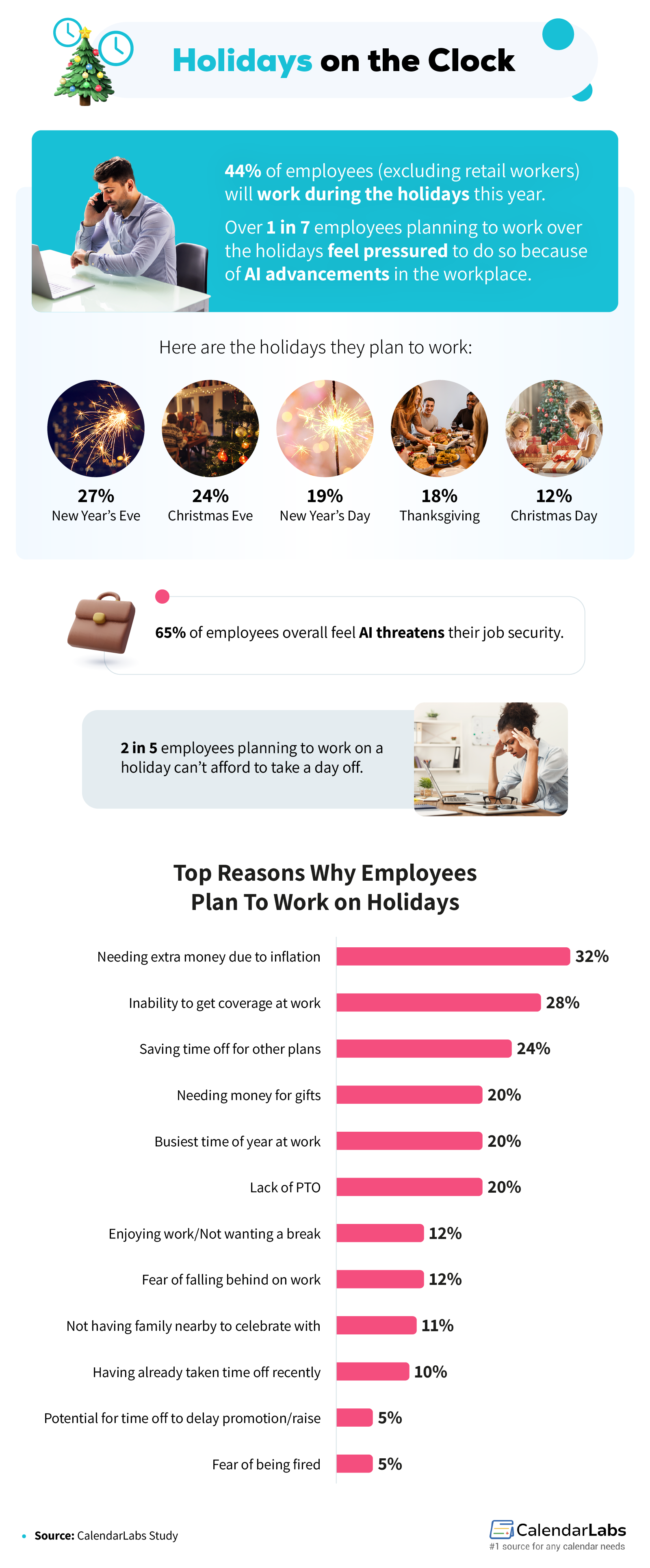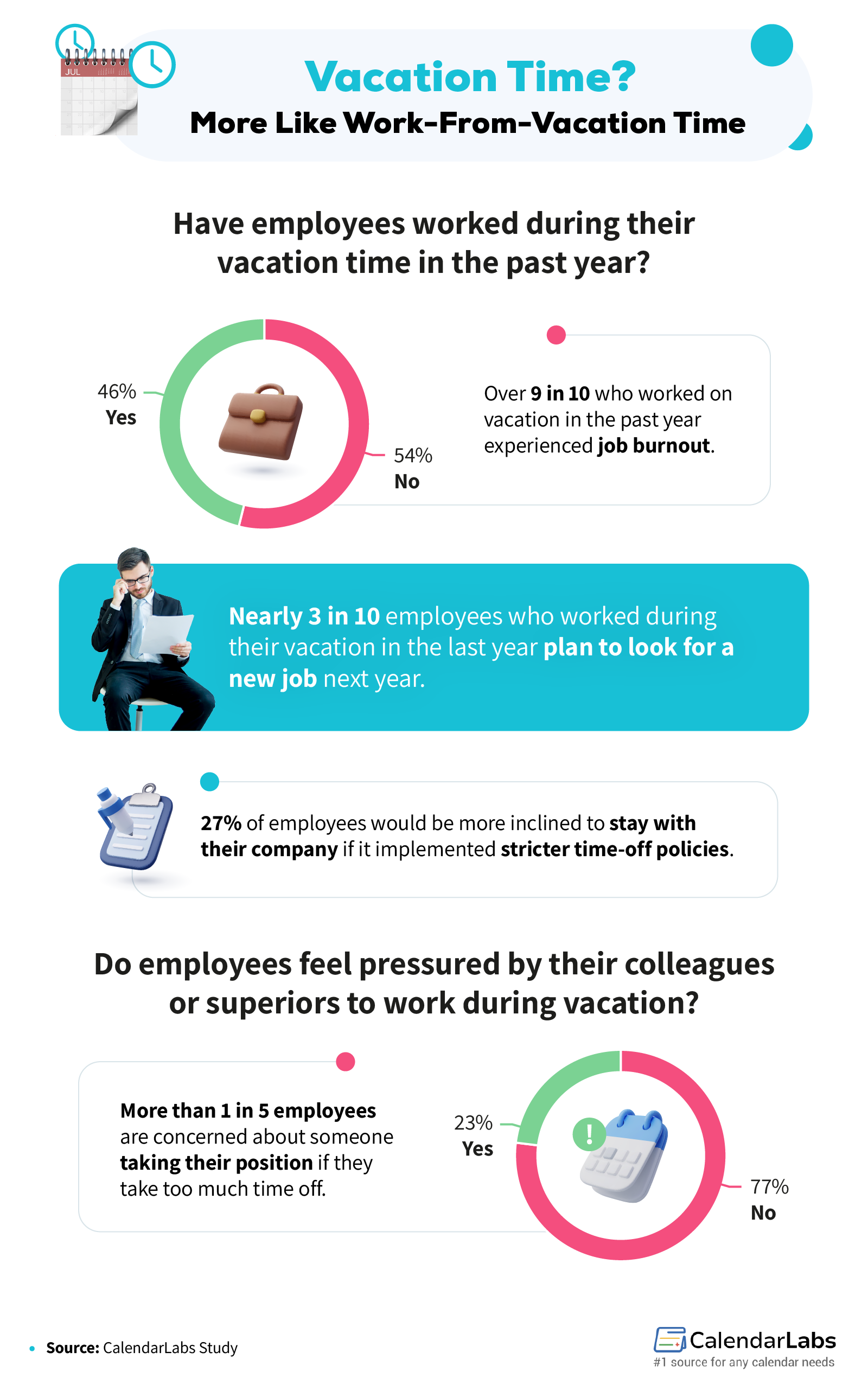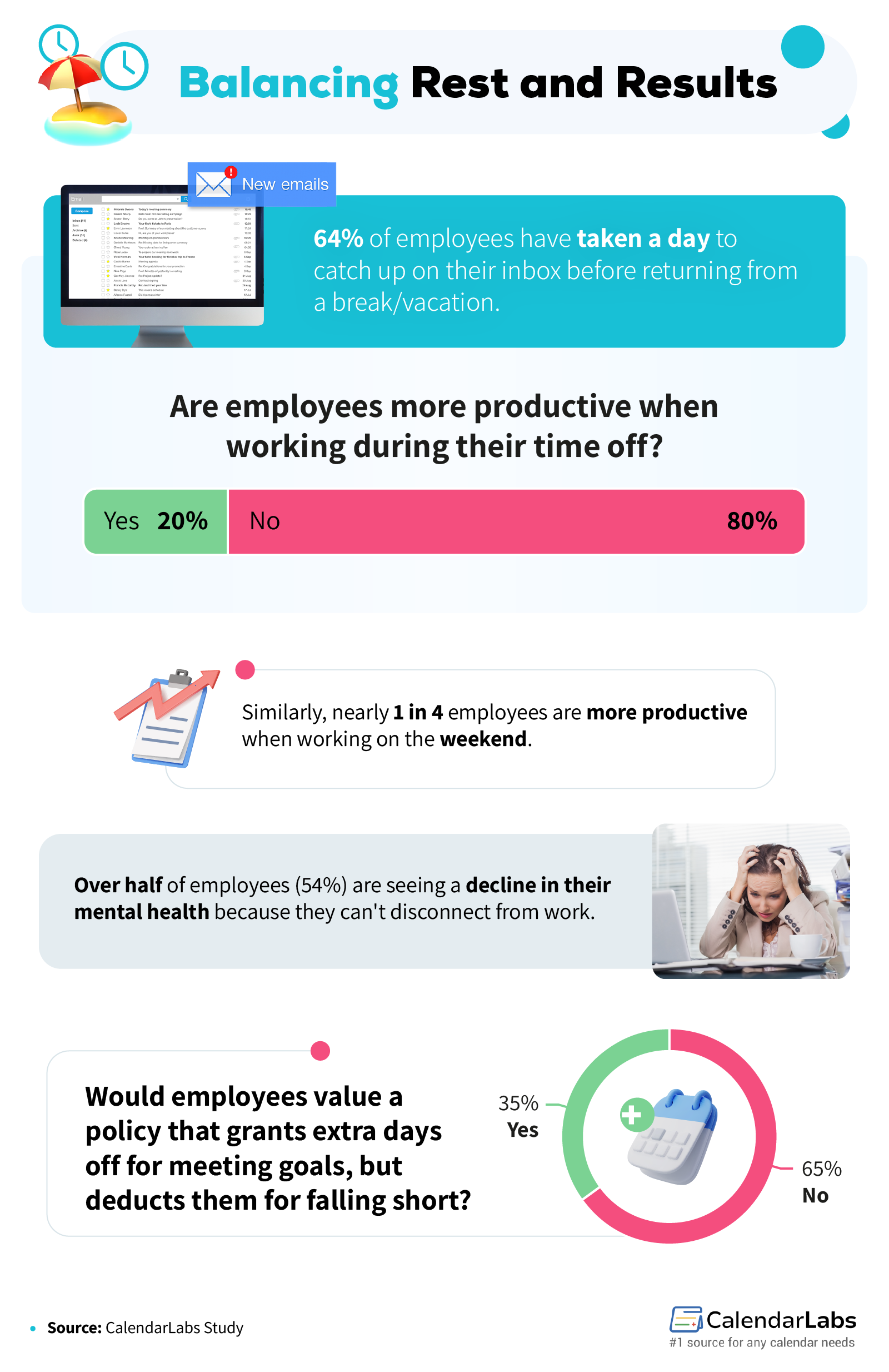
Holiday Hurdles: Navigating Work, Time Off, and AI in the Festive Season
Have you ever found yourself checking work emails while sipping on eggnog at a holiday party or reviewing a work presentation in between Thanksgiving dinner courses? You're not alone. The holiday season, although traditionally reserved for rest and celebration, has increasingly become a battleground between work obligations and personal time.
We wanted to explore the various factors that influence how and when employees choose to step away from their work duties, from the pressure to work due to advancements in artificial intelligence (AI) to starting side hustles. To understand how Americans handle their time off during the holidays, we surveyed 1,014 full-time employees about their holiday work habits, feelings about AI in the workplace, and the impact of remote work on their holiday plans.
Our insights shed light on the evolving relationship between work and leisure during the most wonderful time of the year.
Key Takeaways
- Nearly 1 in 5 non-retail employees will be working during Thanksgiving this year, and over 1 in 10 will be working on Christmas Day.
- More than 1 in 7 employees working during the holidays feel pressured to work because of advancements in AI.
- In the past year, nearly half of employees (46%) worked while on vacation.
- Nearly 3 in 10 employees who worked on vacation in the last year plan to look for a new job next year.
- 65% of employees would not be interested in a policy that rewards them with additional days off for meeting goals but deducts days if goals are not met.
Holiday Cheer vs. Work Responsibilities
As we begin to unwrap our findings, let's examine the relationship between celebrations and work obligations according to our survey respondents.

As the holiday season approaches, many Americans get caught in the crosshairs of balancing work and celebration. The advent of AI has also added a new layer of complexity to this dynamic. More than 1 in 7 employees who said they'll work during the holidays expressed that AI advancements make them feel pressured to do so.
Also, nearly 3 in 10 respondents overall shared that they plan to keep up-to-speed with AI advancements over the holidays. These sentiments might stem from a number of issues AI can have in the workplace. For example, AI increases productivity but also expectations for workers' output. It has also created competition for work in some industries, and although it can save time in many areas of business, it can end up adding additional tasks to the workflow.
Overall, over 1 in 10 non-retail employees said they'll be clocking in on Christmas Day, and even more — nearly 1 in 5 — will work on Thanksgiving. Remote and on-site employees were equally as likely to work on Thanksgiving, with 21% of both groups planning to do so. However, remote workers were 45% more likely than their on-site counterparts to work on Christmas Day.
Family traditions and travel needs vary, but it seems that most Americans prefer to hold their festivities on December 25 — or their bosses assume they do. Employees were far more likely to work on Christmas Eve (24%) than on Christmas Day (12%). This was especially true for IT professionals, who were 61% more likely to work the day before Christmas than the day of. As for New Year's Day, on-site workers were 24% more likely than remote ones to work it.
With the holidays fast approaching, more than half (52%) also told us they were gearing up to work a side hustle in addition to their full-time job. This trend was particularly pronounced among remote workers, who were 18% more likely than those on-site to take up a side hustle around the holidays. Remote work's flexibility can make it easier to work multiple jobs, which can come in handy during the gift-buying season.
Vacations or Vocations?
Let's look into the impact of these trends on the American workforce and how employees are navigating taking time off in the digital age.

With technology making it possible to reach people almost anywhere, anytime, the line between work and leisure time is becoming increasingly blurred. In the past year, nearly half of employees (46%) reported that they worked during their valuable vacation time. This trend was even more pronounced among remote workers, who were 17% more likely than their on-site counterparts to do so. Men were also 9% more likely to than women. However, Gen Zers were the least likely (only 36%).
Almost 25% of employees overall felt like co-workers or bosses pressured them to work while on vacation, but it was even more common among IT employees (30%). Among all employees who worked during time off, over 90% experienced job burnout in the past year. But it seems that for many people the demands of their jobs alone have been overwhelming enough: 75% of workers who didn't work during time off also reported feeling burnt out in the past year.
So, how can managers help ease employees back into work after taking vacation time? According to a 23-year-old on-site employee, it's about "not making me feel like I missed something, or overloading me the day I get back." A 38-year-old remote employee echoed this sentiment, adding that managers should avoid "booking meetings, or sharing updates on priority projects and next steps the first day back." And for a 55-year-old hybrid employee, it would help to "reduce the number of emails and other notices that I will receive upon returning to work."
The stakes are high for employers, as nearly 3 in 10 employees who worked during their vacation in the last year said they plan to look for a new job in the coming year. But over one-quarter said they would be more inclined to stay if their company was stricter about their time-off policies. For instance, it might help if availability expectations were stated explicitly.
As we move forward, it's clear that helping workers strike a balance between work and leisure is more important than ever, and managers play a crucial role.
Work and Well-Being
The last part of our study examines how the struggle between work and personal life manifests, how employees feel about company vacation policies, and the potential consequences of each on their well-being.

The struggle to disconnect is a common theme among today's workforce, with 64% of employees admitting they have taken a day to catch up on their inbox before returning from a break or vacation. This trend was even more pronounced among remote workers, who were 29% more likely than on-site employees to report feeling more productive when working over the weekend, when they can focus on the task at hand without other work-related distractions. Men were 18% more likely than women to feel that way.
We also saw a gender divide regarding company vacation policies. Men were 33% more likely than women to favor a policy that rewards meeting goals with additional vacation time but penalizes you for unmet goals with vacation deductions. However, the majority of employees (65%) did not feel the same, indicating that while there is a desire for more flexibility and rewards, there is also a need for stability and predictability when it comes to time off.
While it's important to balance work incentives against stability in allowing employees to take the time off they need, it's also crucial to understand how important vacations are to employee well-being. Being constantly "on" at work can have serious health implications, as evidenced by over half of employees reporting mental health decline because of it. We also found that remote workers were 16% more likely than on-site ones to suffer mentally due to their inability to disconnect from work. This should concern managers and business leaders, as the remote workforce continues to grow.
Embracing the Holiday Spirit in the Modern Workforce
The holidays often come with the challenge of balancing work and leisure, with AI, side hustles, and remote work adding complexity to the mix. While our data reveals a divide in employees' vacation policy preferences, it also underscores the importance of disconnecting from work to maintain good mental health. As the workforce evolves, employers need to foster a culture that values personal time while ensuring work obligations are met. Let's embrace the holiday season as a time for celebration, relaxation, and reconnection with loved ones, leaving work-related stressors behind.
Methodology
We surveyed 1,014 full-time employees to explore Americans' experience with taking time off during the holidays.
About CalendarLabs
CalendarLabs offers a range of customizable and printable yearly and monthly calendar templates, catering to a variety of individual and business needs. With options including holidays in over thirty countries, photo calendars, and useful calendar content widgets for blogs and websites, CalendarLabs is your go-to destination for all things calendar-related.
Fair Use Statement
We invite you to share the insights from this study with your audience for any non-commercial use. Please ensure that you include a link back to this page, so readers have access to our full findings and can explore the topic in greater depth.
